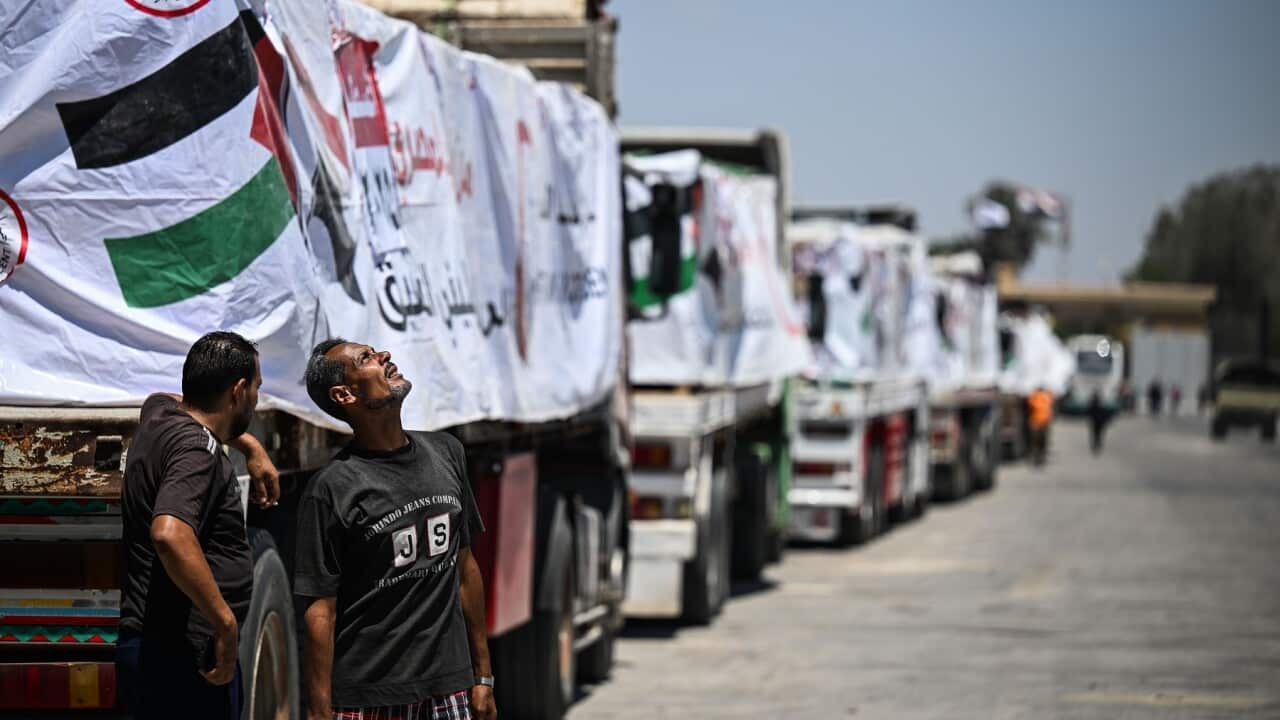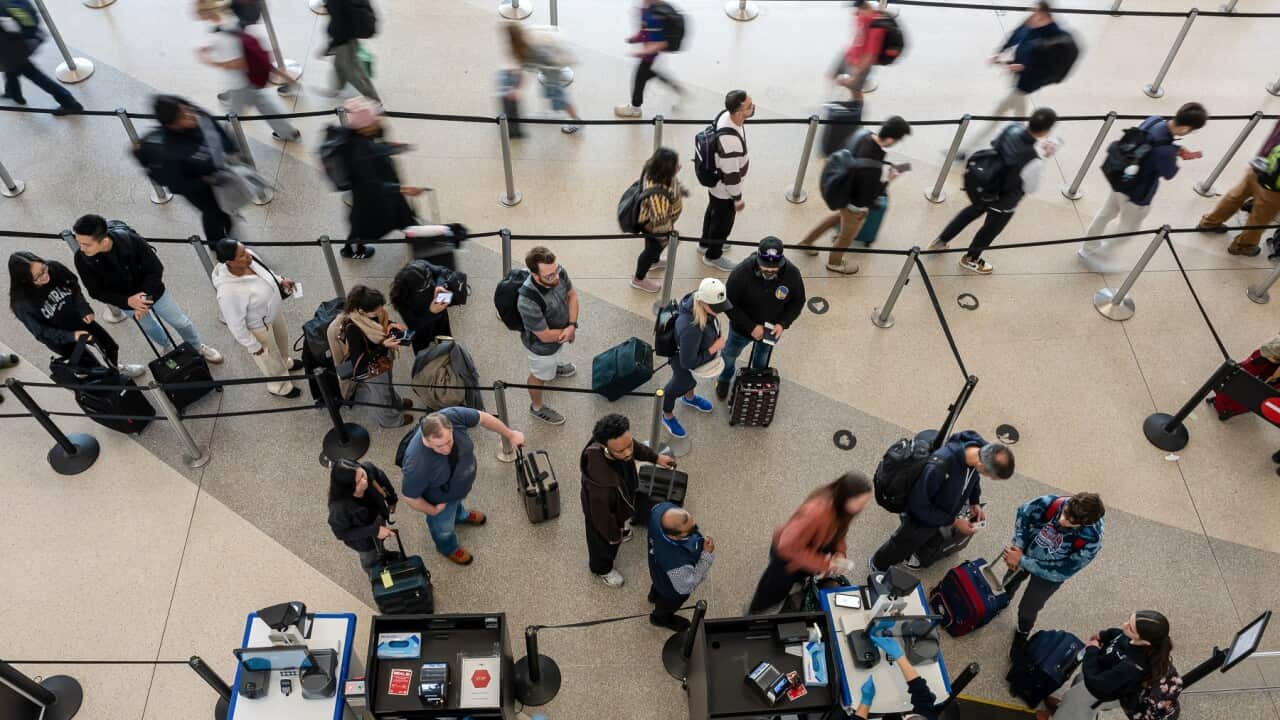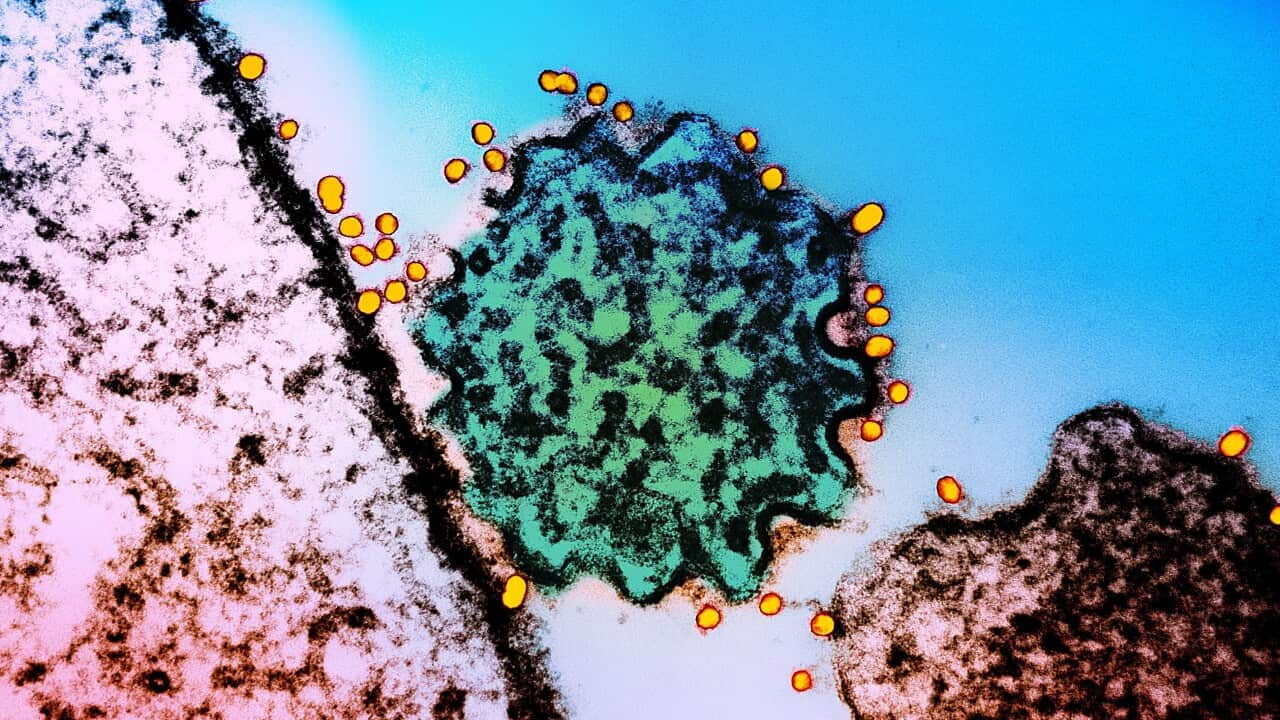Listen to Australian and world news, and follow trending topics with SBS News Podcasts.
TRANSCRIPT
It’s been another day of slow progress and mounting frustration on the humanitarian front in Gaza, as aid convoys struggle to cross the border while the death toll continues to rise.
At the Rafah crossing on Egypt’s side, hundreds of trucks carrying food and medical supplies remain stuck, many for weeks.
Drivers say their shipments are being turned back for what they call minor issues, like missing stickers or slightly damaged pallets.
Kamel Atteiya Mohamed, an Egyptian truck driver, says such rejections make no sense.
"I'm carrying baby milk, this is the second time I've gone in and came back. They tell you, for example, that the pallet doesn't have a sticker, the pallet is tilted, or the pallet is open from the top. So this is not a reason at all for us to return it.”
Another driver, Essam Shaaban, described repeated failed attempts to get aid into Gaza, blaming delays on the Israeli side.
"We came today to bring this aid to enter Palestine, for our oppressed brothers inside. Unfortunately, this is the third time we have entered and we could not pass. Thousands of trucks, as you can see, hundreds and thousands of trucks enter the Israeli side here from the Egyptian side. The crossing here (in Egypt) is open 24 hours, as you can see. It does not close, but the obstruction is from the Israeli side. Every day, they take 30 or 40 trucks in and tell you that we closed, and that’s it, and the trucks come back again as you can see.”
Former Irish President Mary Robinson and former New Zealand Prime Minister Helen Clark are visiting Egypt's Rafah crossing [[9-12 August 2025]] - as part of The Elders group founded by Nelson Mandela.
They say they saw evidence of aid being blocked; and also heard witness accounts of civilians being killed trying to access aid.
Ms Robinson says she learned the details of how Israeli authorities are blocking aid, after talking to Red Crescent staff and truck drivers.
"It was interesting to talk to a driver who was being rejected for the second time because of minor problems, even though there is very good checking, as we know, by the Egyptian Red Crescent and by the UN in collaboration, very good checking, and yet he was rejected, and this is for the second time, and we know that many are rejected for often for no reason at all, or for work reasons that although people are working on this side, they're not working as hard on the other side, all of the obstruction is on the other side."
The official Israeli unit tasked with co-ordinating aid, COGAT, insists there is no limit on the amount of aid entering Gaza, saying it is facilitating deliveries and transferring around 300 trucks daily via all land crossings.
It says hundreds of truckloads remain uncollected on the Palestinian side; and it rejects allegations of deliberate obstruction.
This comes as the Palestinian Authority's Foreign Minister, Varsen Aghabekian, tells SBS News that Palestinians are dying daily whether by Israeli fire, or by hunger.
"The Palestinians, we are in a lot of pain. We are under this genocidal, brutal war. Our civilians are dying by the day. The starvation is a reality. It's a daily reality. In Gaza, we need to work on stopping that so that people can look forward for a better future and a better life."
With land access restricted, some aid is being delivered by air.
In Deir al-Balah, central Gaza, parachutes were seen descending from the sky on Wednesday, part of a series of airdrops also targeting Khan Younis and areas near Gaza City.
The UN says that measure is far short of the amount of aid needed to stave off famine, which it estimates is 600 trucks a day.
To add to the deadly daily grind, life for many displaced Gazans is becoming unbearable in the summer heat.
On Gaza City’s beaches, tents have sprung up, offering little shelter from temperatures described as deadly hot.
Shaimaa Joundiah, a mother caring for her injured husband and young son, says the conditions are relentless.
"All day it is unbearably hot. We get dizzy from the heat. My son cries a lot, and my husband is injured; he cannot handle the heat and gets dizzy. Despite this, we endure it quietly. The heat, extreme heat, it is an oven. You can see he is dizzy. He is just thrown there from the heat. At midday he sleeps on the beach, on the sand. At night he sits and cries too. Not only during the day it is hot, but the nights are also very hot; there is no coolness. It is true, but it is deadly hot.”
Another displaced woman, Suad Salem, says her health problems - which include high blood pressure, diabetes, and heart palpitations - are worsened by the conditions; and she is battling skin infections due to a lack of clean water.
"I need three jerrycans of water a day to throw on myself because of the chickenpox and the scabies… my son. We thank Allah, we thank Allah. What can we do?”
Meanwhile, the Palestinian death toll, according to Gaza health authorities, now stands at 61,722 since the war began in October 2023, with over 154,000 wounded.
In the past day alone, Israeli attacks have killed 123 people and injured more than 400, according to Gaza's health authorities.
Officials also report eight more deaths from famine and malnutrition, including three children, bringing the total to 235 hunger-related fatalities.
Israel disputes these figures, saying many of the reported malnutrition deaths had pre-existing conditions and that at least a third of overall deaths are combatants.
Despite the worsening humanitarian crisis, Israel’s military chief Eyal Zamir has approved plans to expand the offensive into refugee camps in central Gaza and the southern Al-Mawasi area, where most of Gaza’s 2.2 million residents have sought shelter.
Prime Minister Benjamin Netanyahu says this stage is aimed at seizing remaining Hamas strongholds, a move that has drawn widespread international condemnation.
From Ankara, Turkiye's foreign minister Hakan Fidan is pushing for an immediate ceasefire, accusing Israel of weaponising hunger.
"Why is it crucial to achieve an immediate ceasefire? To ensure humanitarian aid can enter Gaza. The biggest problem, the biggest threat in Gaza right now, is that two million people are starving. Hunger is being used - this is part of Israel's policy - to force people into accepting exile and displacement."













